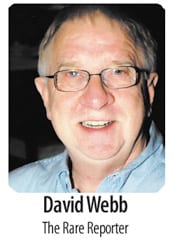Even at 65, anti-gay slurs have the power to cause pain, fear
 It would seem like time might soothe the sting of anti-gay hate slurs such as “faggot.” But I recently learned that the hateful language shocks my senses as much at 65 as it did a half-century ago.
It would seem like time might soothe the sting of anti-gay hate slurs such as “faggot.” But I recently learned that the hateful language shocks my senses as much at 65 as it did a half-century ago.
A dispute with neighbors about their large dogs running loose and attacking my little 10-pound poodle led to a 14-year-old youth in their supervision calling me a “faggot.” The word shocked me so that at first I thought his female guardian had uttered it. But the teenager confirmed he said it.
The teenager also disputed my claim about the dogs running loose for an extended period of time while they were out of town, during which time my little dog was attacked by their big boxer. In essence, the teen called me a liar.
In fact, the attack the teenager claimed didn’t happen so scared my dog she trembled and cried under the bed for an hour. Fortunately, she seemed to suffer no serious physical injury, despite the boxer briefly having a death grip on her neck.
During the confrontation with the family, the adult male in the teenager’s company supported the youngster’s anti-gay remark, asking me, “Well, what are you?”
I didn’t answer the question. I hardly knew what to say. But I did call law enforcement for assistance. It marked my third call to 911 over the weekend — two about the dogs running loose and one about the dispute.
I asked the teenager if he learned that language from his family. He said, “I learned it a school. I was raised by a good Christian mother.” I was already aware his family spent a significant amount of their time at church.
The law enforcement officer listened to my side of the complaint, and he talked to the family and the youth. He told me that he advised the youth it was wrong to call people names, but he told me it was a “freedom of speech issue” and amounted to no crime.
I told the officer I believed the use of anti-gay slurs represented harassment, but I dropped it at that point. He told me at one point early on that I needed to calm down because I was at risk of making him mad and “that’s not going to help you.” He mentioned something about an apology from the youth, but I told him I wanted no further conversations with anyone in the family.
I pointed out the teenager’s remark about someone who lives alone, never throws parties and lives a really quiet life disturbed me because of the potential for what might be said to a same-sex male or female couple or single people who entertain frequently.
The teenager’s slur also surprised me in part because it seems to contradict what school officials report. They claim to be educating students about diversity and the need for tolerance in an effort to dissuade bullying.
At no time did anyone inquire about the health of my dog or about my own health even though I was knocked to the ground when the dog attacked.
Overall, I think law enforcement did a good job concerning my multiple complaints. But the last officer left me with the impression that they could use more training in the area of hate language and where it can lead. I made a special request that he include in his report the fact that the teenager had used the word “faggot” during the dispute.
If a teenager would yell “faggot” at a 65-year-old man who just called law enforcement, and then argue with that older man about the truth of his statements, what would he say or do to another student? Will I wake up and find “faggot” written on my car or house? Will that happen to some other LGBT person?
Coincidentally, the Southern Poverty Law Center’s Intelligence Report magazine, outlining its annual report on hate groups operating in the United States, arrived in my mailbox today. Under the category of General Hate with a specific Anti-LGBT focus, the human rights group identified 44 in operation of the total 784 hate groups documented in the nation last year.
Many of the group’s names use words like church, family, moral, ministries, mission, parents and such. The groups are located nationwide, and three have addresses in Texas, including Fort Worth, Plano and El Paso.
It’s pretty easy to understand how teenagers can be conflicted by the confusing messages they must be getting at home, church and school.
For me, it’s another lesson learned. No matter how hard I try to be a good neighbor, I will be at risk of — at the very least — verbal assaults because of my sexual orientation, and the words will hurt as much as they ever did.
David Webb is a veteran journalist with more than three decades of experience, including a stint as a staff reporter for Dallas Voice. He also previously worked as a researcher and writer for SPLC. He freelances for publications nationwide.
This article appeared in the Dallas Voice print edition March 20, 2015.

